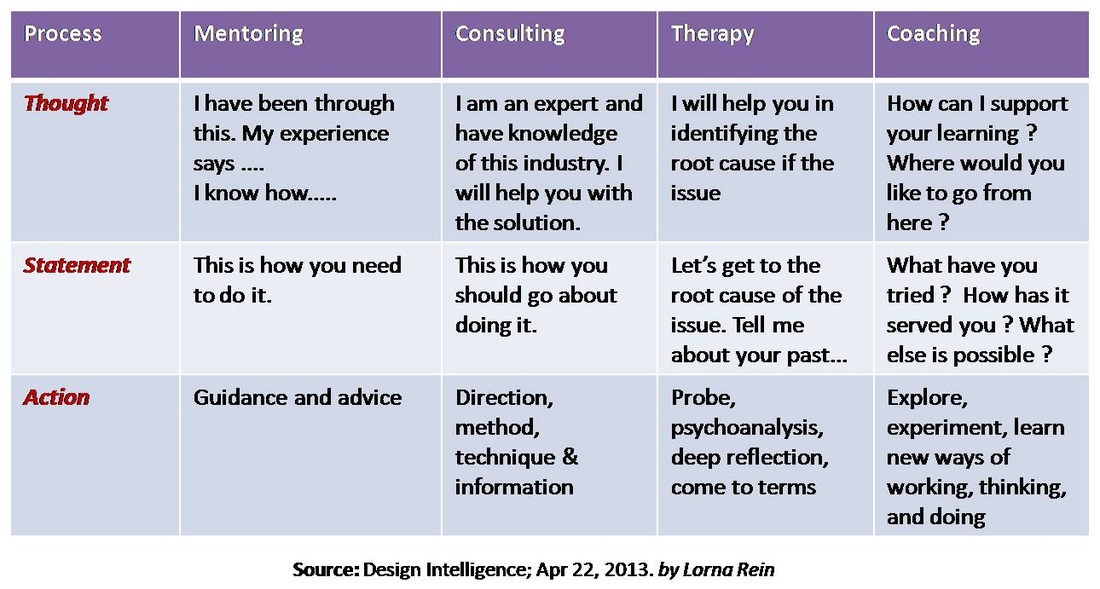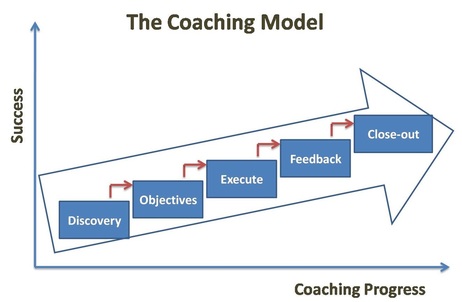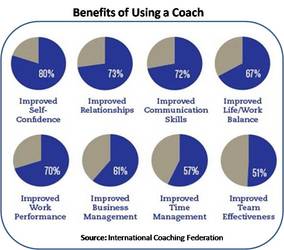?What is Executive Coaching?
Executive Coaching is a synergistic relationship between a qualified Coach and the Executive with the aim of enhancing the Executive?s management and leadership performance and development. Coaching is not telling people what to do; rather, it's giving them a chance to examine what they are doing in light of their intentions. Through a process of inquiry and dialog, it provides a specific way of ?learning? for the Executive that provides deep behavioral insights intended to accelerate their effectiveness as a leader.
Executive Coaching helps leaders get unstuck from their dilemmas and assists them to transfer their learning into results for the organization.
Difference between Coaching, Mentoring, Therapy & Consulting
Mentoring or Therapy versus Coaching-
Mentoring and Therapy looks at the past experiences that might be the root cause in the way the client thinks or behaves that is coming in the way of his/her performance;
Coaching looks at the present and the future, i.e. what does the client want, and how can they plan to get what they want.
Consulting versus Coaching-
Consultants study and analyse the needs of an organisation or individual and offer their solutions based on their specialised expertise to ?fix? the problem; Coaching uses various tools and techniques to help clients to generate their own solutions and then hold them accountable for it. Also, the coach 'works' with the client till the goal is achieved.
The below table provides an illustration between the 4 entities:

The Coaching Engagement
Coaching can either be done on a one-on-one basis or, for a group. It will involve multiple Coaching sessions, 1 hour each; the number of sessions will depend on the goals and the timelines by which they need t be achieved.
Typically, the areas that have been found very useful and productive for Coaching are:
- Coping with change
- Raising performance levels
- Career progression
- Adjusting to new role
- Meeting high expectations
- Attitude issues
- Depression
and many such cases?
Benefits of using a Coach
- Greater productivity, and better alignment to organisational needs
- Identify the client's strengths and development needs
- Deeper learning about yourself, how your're perceived, and areas that you can improve
- Getting into faster actions - advancing things faster and with greater precision
- Awareness of perspectives, beliefs, and attitudes that may be holding you back
- Clarity on your values and what you stand for, which leads to greater conviction
- Getting someone to lean on for emotional support, empathy, and encouragement
- Improve specific skills such as communication, delegation, conflict management, team building, persuasion, etc.
- Get regular ongoing feedback from the Coach
The Coaching Model

The Coaching Model Phases:
Establishing the Coaching Agreement: This includes agreeing on the terms of the Coaching contract, agreement and guidelines at the very beginning.
- Establish commitment from the organization and from the Executive who will be coached so that clear guidelines are understood by both parties
- Discuss the importance of confidentiality in the coaching relationship. The information shared between coach and coaching Executive is to remain private. The coach will sign a confidentiality agreement.
- Discovery:
This forms the basis for the entire programme. It covers the following:
- Understanding the personality; the stake-holders
- What is the organisational expectations from you?
- Your values, beliefs, strengths and areas of improvement
- Study of any previous assessment data or feedback collected for the Executive
- Decide on the approximate number of Coaching sessions to be conducted
- Objectives:
- Identify the most important objectives and specific performance goals
- Have a measurable outcome-based action plan in place identifying key behaviors that need to be changed
- Execute:
Execute the required actions and behavioral changes so the desired results will be achieved.
- The coach provides the necessary support through formal coaching sessions as pre-decided.
- The Executive will commit to the time agreed upon for the sessions.
- Each coaching session will be driven through an inquiry and dialog-based conversation.
- The outcome of each session would be focus action points that would be decided between the Executive and the Coach.
- At the end of each session, the Executive will fill out a form in order to faclitate direction, clarity of action, and the actions that would be carried out before the subsequent session.
- In-between the sessions, the Coach will provide necessary support through email or WhatsApp or Sms messages.
- Progressive Review and Feedback:
Conduct a monthly informal review of the coaching process. The coaching participant meets with his/her manager to:
- Share progress, outline areas still in need of improvement and ask for support.
- Gain feedback from the manager and discuss solutions to meet the coaching objectives.
- Provide feedback on the coaching program and success with the coach.
During these informal reviews, feedback is collected from follow-up conversations with the key stakeholders to identify what changes have taken place and what still needs improvement.
- Close Out:
At the end of the coaching engagement, a review of the entire engagement takes place.
- During the last formal coaching session, the coaching participant will prepare and discuss a one-page overview of what has been learned and key action steps to continue the progress achieved.
- After the last session, the key stakeholders, immediate boss and human resources will participate in a close-out meeting. They will review the success achieved, create a future action plan, and identify the type of support and resources necessary to continue the executive?s development.

The ICF defines Coaching as ?...partnering with clients in a thought-provoking and creative process that inspires them to maximize their personal and professional potential, which is particularly important in today?s uncertain and complex environment.?

Everyone needs a coach. It doesn?t matter whether you are a basketball player, a tennis player, a gymnast, or a bridge player???.Bill Gates

?The best advice I ever got from someone, ?Have a coach.? I initially resented the advice, because after all, I was a CEO. I was pretty experienced. Why would I need a coach? Am I doing something wrong? My argument was, how could a coach advise me if I'm the best person in the world at this? But that's not what a coach does. The coach doesn't have to play the sport as well as you do. They have to watch you and get you to be your best. In the business context a coach is not a repetitious coach. A coach is somebody who looks at something with another set of eyes, describes it to you in [his] words, and discusses how to approach the problem. Once I realized I could trust him and that he could help me with perspective, I decided this was a great idea. When there is a business conflict you tend to get rat-holed into it. My coach?s general advice has been to rise one step higher, above the person on the other side of the table, and to take the long view.? ....Eric Schmidt, Chairman and CEO Google, Fortune Magazine, July 2009

